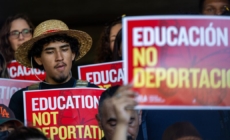-
‘Can I just be a kid?’ Students shaken by immigration raids seek help from school counselors - 32 mins ago
-
ICE ordered to release man from 24/7 guard after leg break %%page%% %%sep%% %%sitename%% - 46 mins ago
-
Tom Brady praises Steelers' Aaron Rodgers playing into his 40s: "He's a surgical passer" - 47 mins ago
-
Take this week’s American Culture Quiz and test your knowledge of farmers, baseball and more - 47 mins ago
-
How Did Dillon Gabriel Do in His First Start With Browns? - about 1 hour ago
-
Derek Jeter: Cowboys’ Dak Prescott Needs To Win To ‘Change The Narrative’ - 2 hours ago
-
‘Golden Bachelor’ alum Gerry Turner engaged months after Theresa Nist divorce - 2 hours ago
-
How to Watch Dolphins vs Panthers: Live Stream NFL Week 5, TV Channel - 2 hours ago
-
Bills’ Josh Allen, Eagles’ Nick Sirianni Lead: Who Has It Better Than them? | FOX NFL Sunday - 2 hours ago
-
Small earthquake cluster hits near Big Bear Lake in San Bernardino County - 3 hours ago
Map Shows Worldwide Fight Over Democracy
Democracy is deteriorating in much of the world and changes in the United States under President Donald Trump threaten to accelerate the decline, according to a pro-democracy institute that has the backing of the governments of 35 electoral democracies around the world.
The White House rejected accusations that democracy was being undermined under the Trump administration and told Newsweek that, on the contrary, it was being restored.
The International Institute for Democracy and Electoral Assistance (International IDEA), based in Sweden, released its annual report on the global state of democracy on Thursday. Its member states include the U.S.’s NATO allies Canada, France and Germany, as well as India, Indonesia, Brazil and Mexico. The United States is classified as an observer.
“What we’re seeing now is, in some respects, in some key respects, a more acute deterioration than we’ve seen in the past,” Kevin Casas-Zamora, secretary-general of International IDEA, told Newsweek.
Why It Matters
As well as highlighting the challenges facing democracies around the world, it also underlines the polarization between more progressive views of the way democratic governments should function in what they call an inclusive manner, and more conservative views prioiritizing what they say are personal liberties and the rights of voters within nation states.
What To Know
In 2024, well over half the countries analyzed showed a very significant deterioration in at least one key element of democracy, whether that was credible elections, press freedom or the quality of civic space, Casas-Zamora said. That compares to only one-third of countries assessed a decade ago, at a time when roughly the same number were also advancing.
“We’ve sort of shifted from a balanced world to one which is moving in an anti-democratic direction,” Casas-Zamora said.
The most severe drop was in press freedom when compared with five years ago, but the indicator for the credibility of elections was at its lowest in 30 years. The only indicator that remained strong was civic activism, although indicators for the absence of corruption were also trending in a positive direction, he said.
Newsweek used International IDEA data to plot a map of where it says democracy has been in decline compared to five years ago. As the latest data runs up to 2024, Casas-Zamora said it did not take into account changes in the United States under Trump, which he said were negative for democracy worldwide.
Halt of Global Advance
“The almost irresistible global advance of democracy over the past 70 years had to do with the fact that the pre-eminent geopolitical power was a liberal democracy that was committed to the cause with a lot of inconsistencies and a lot of hypocrisy and double standards and the rest of it,” Casas-Zamora said.
“What we’re seeing today is telling us that you cannot count on the U.S. to advance the democratic cause—quite the opposite.”
Changes included the collapse of the USAID foreign aid organization at the same time European countries that had also been big funders of pro-democracy groups were diverting more money to defense spending.
“There’s a kind of a toxic brew coming together at the same time,” he said. “There’s less money to go around to support democracy. The field is being completely reconfigured.”
White House Says Trump Restoring Democracy
The White House rejected any accusation that the United States was undermining democracy.
“President Trump is restoring democracy and oversight to our foreign assistance enterprise, which previously enabled unelected bureaucrats to dole out $40 billion every year without accountability to taxpayers. Thanks to this President’s leadership, the entire Executive Branch is aligned with the America First agenda people voted for,” White House Deputy press secretary Anna Kelly said in an email to Newsweek.
From the perspective of Trump and his supporters, threats to democracy have included such things as mail-in ballots, unelected bureaucrats and judicial overreach to stymie his program, while abroad the administration has challenged alleged attacks on free speech, including from European allies.
Trump’s opponents accuse him of behaving in an increasingly authoritarian way, cosying up to foreign autocrats and questioning whether he wants another election after his supporters tried to reverse the results of the 2020 vote, which he lost to Joe Biden before his return in 2024.
Extreme Polarization
Extreme polarization, high levels of inequality and the role of social media had all helped weaken democratic society, Casas-Zamora said.
“You also have the perception, the widespread perception, that democratic systems are not responding in an agile way to social expectations and demands,” he said, citing the United States as an example of that broader process.
“I can already see that the big story for the next report will be the precipitous drop of the U.S. in pretty much every ranking.”
Once a country shifts from democracy to a more autocratic system, it can be hard to reverse, Casas-Zamora said.
“It is underestimated how difficult it is to reverse a process of democratic backsliding, and it is also probably not entirely understood the extent to which forces that are not fully committed to liberal democracy have just become part of the landscape in democracy. This is a problem that we will not solve. This is a problem that we have to manage as so many others.”
Source link































